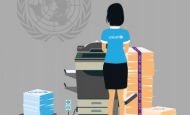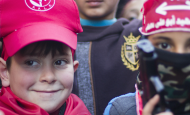EU Statement on Palestinian Children Parrots NGO Claims and Ignores Child Abuse
On January 12, 2017, the European Union Representative and the EU Heads of Mission in Jerusalem and Ramallah issued a “statement on the situation regarding Palestinian children arrested, detained and prosecuted by Israeli authorities.” The statement unsubtly implies misconduct and ill-treatment by Israeli authorities – echoing a well-coordinated NGO campaign that accuses Israel of “grave violations” against children in order to advocate for Israel’s isolation – while providing no verifiable evidence.
The proximate trigger for the statement is “deep concern regarding the circumstances of the recent arrests of two Palestinian minors, Ahed Tamimi and Fawzi Muhammad Al-Juneidi, as well as the fatal shooting by Israeli security forces of another Palestinian minor, 17-year old Musaab al-Tamimi, during protests in the occupied West Bank on 3 January.”
However, the EU statement does not provide accounts of these. Regarding Musaab al-Tamimi’s death, the EU omits news reports that he had been armed with a gun during violent clashes (see articles in Ha’aretz and YNet). Similarly, Ahed Tamimi was arrested and indicted on multiple counts of assault against law enforcement officers, throwing stones, and incitement to commit suicide attacks.
The EU also “calls on Israeli authorities to respond proportionately to protests, and open investigations following fatalities, in particular when involving a minor.” This invokes unsupported NGO allegations that Israel routinely uses disproportionate force and/or covers-up fatal incidents involving children. In contrast, as noted in the abovementioned news articles, Israeli authorities had already begun investigating the shooting incident.
There is also gratuitous reference to “The use of administrative detention of children without formal charge.” Neither of the arrested Palestinian minors was placed in administrative detention.
Taken as a whole, the EU statement reflects the influence of a political campaign led by a number of self-proclaimed “human rights NGOs” – some of which have confirmed or reported ties to the EU-designated Popular Front for the Liberation of Palestine (PFLP) terrorist organization. This campaign, spearheaded by the Palestinian NGO Defense for Children International-Palestine (DCI-P) with the label “No Way to Treat a Child,” disseminates false and/or misleading accusations of child abuse and ill-treatment against Israel in order to advocate for sanctions and other measures (for further details, see NGO Monitor’s report “No Way to Represent a Child: Defense for Children International – Palestine’s Distortions of the Israeli Justice System”).
A central aim of this campaign is to convince the UN Secretary-General to blacklist the Israel Defense Force (IDF) by including it in the “Annex” to his annual report on grave violators of children’s rights – alongside terror groups such as ISIS, Boko Haram, and Al-Qaeda. UNICEF, the UN agency trusted with defending children’s rights, also plays a key role in legitmizing this process through its leadership of a “working group” on Israel made up of terror affiliated and/or radical political advocacy NGOs. As documented in NGO Monitor’s report, the NGO members of this group feed unverifiable and factually inaccurate data and reports into a database that is used by UNICEF in crafting its own reports. In this way, UNICEF promotes the NGO campaign, whose claims are then echoed in other UN documents and ultimately in the UN Secretary-General’s annual report on Children and Armed Conflict. NGO members of UNICEF’s Working Group include DCI-P, B’Tselem, Palestinian Center for Human Rights (PCHR), and World Vision.
Further, although Palestinian armed groups routinely use children as combatants, there is little evidence that UNICEF devotes resources toward exposing or ending this practice. In fact, a UNICEF Children and Armed Conflict (CAAC) bulletin admits that “In Gaza, the Working Group was not in a position to document cases of child recruitment and use of children in armed conflict owing to a number of factors, including security and protection risks related to collecting comprehensive and detailed information” (emphasis added). The NGOs’ and UNICEF’s failure to monitor and report on Palestinian minors involved in violent attacks negates this form of child abuse – namely, incitement, recruitment, and weaponization. This critical dimension of the conflict goes unmentioned by the EU in its statement.
In 2012-2017, the EU provided $27 million to “UNICEF-State of Palestine.” It would appear that, in return, the EU has adopted the same failures of UNICEF and its NGO partners, undermining its commitment to children’s rights in the region.




